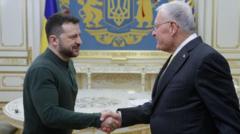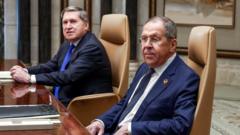Ayatollah Ali Khamenei reiterated his opposition to negotiating with the U.S., citing previous experiences but did not fully reject potential engagement, leaving diplomatic doors open amid shifting U.S. stance.
Iran's Supreme Leader Criticizes U.S. Negotiations While Leaving Options Open

Iran's Supreme Leader Criticizes U.S. Negotiations While Leaving Options Open
Ayatollah Khamenei denounces the idea of talks with the United States but hints at continued diplomatic possibilities.
In a recent statement, Iran's Supreme Leader Ayatollah Ali Khamenei condemned the prospect of negotiations with the United States, labeling them as "unwise, unintelligent, and not honorable." This condemnation follows comments from President Trump expressing readiness to resume dialogues with Iran over its nuclear program and other issues.
While Khamenei's remarks reflect his historically hostile approach towards U.S. negotiations, he notably refrained from issuing a definitive prohibition against Iran's engagement with Washington. Such a nuanced stance suggests an underlying recognition of the complexities involved in the diplomatic landscape, as Iranian officials have previously indicated openness to talks.
During a meeting with Iran’s armed forces, Khamenei reflected on past negotiations, particularly mentioning the U.S. withdrawal from the nuclear deal negotiated during the Obama administration. He emphasized his viewpoint that engaging in dialogue with a government that has a history of breaking agreements is futile. “Negotiating with America will solve no problem. The proof? Experience,” he asserted, reminding his audience of the broken commitments from the U.S. side.
Experts have pointed out that Khamenei’s rhetoric may align with his typical public posture, which often rejects negotiations while permitting discreet discussions behind the scenes. For instance, in 2011, Khamenei vocally opposed talks with the Obama administration, yet authorized secret meetings to take place in Oman.
As Iran navigates the evolving political dynamics with the U.S. under President Trump, Khamenei's comments highlight the complexity of international relations and the potential for both tension and dialogue. The interplay of public rejection and potential private negotiations reflects the delicate balance Iran seeks to maintain in its foreign policy.
While Khamenei's remarks reflect his historically hostile approach towards U.S. negotiations, he notably refrained from issuing a definitive prohibition against Iran's engagement with Washington. Such a nuanced stance suggests an underlying recognition of the complexities involved in the diplomatic landscape, as Iranian officials have previously indicated openness to talks.
During a meeting with Iran’s armed forces, Khamenei reflected on past negotiations, particularly mentioning the U.S. withdrawal from the nuclear deal negotiated during the Obama administration. He emphasized his viewpoint that engaging in dialogue with a government that has a history of breaking agreements is futile. “Negotiating with America will solve no problem. The proof? Experience,” he asserted, reminding his audience of the broken commitments from the U.S. side.
Experts have pointed out that Khamenei’s rhetoric may align with his typical public posture, which often rejects negotiations while permitting discreet discussions behind the scenes. For instance, in 2011, Khamenei vocally opposed talks with the Obama administration, yet authorized secret meetings to take place in Oman.
As Iran navigates the evolving political dynamics with the U.S. under President Trump, Khamenei's comments highlight the complexity of international relations and the potential for both tension and dialogue. The interplay of public rejection and potential private negotiations reflects the delicate balance Iran seeks to maintain in its foreign policy.






















